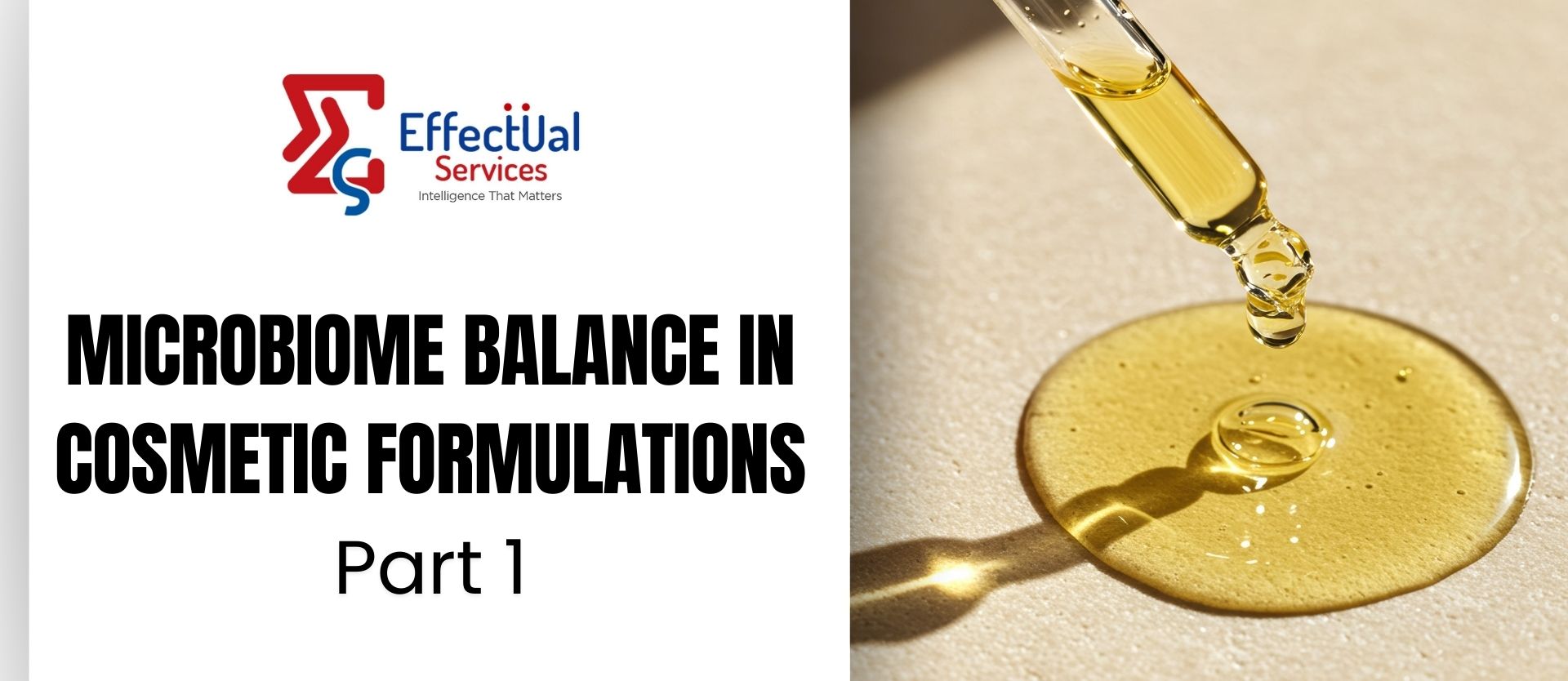Microbiome Balance in Cosmetic Formulations

The study investigates various technologies and methodologies that enhance the stability and viability of beneficial microorganisms in cosmetic composition/product.
The cosmetic industry has embraced the vast world of microorganisms, integrating bacteria, yeast, fungi, algae, and plankton into skincare, haircare, and beauty products. This growing trend reflects the industry's dedication to innovation and sustainability, harnessing microbial diversity to enhance beauty formulations. Beneficial microorganisms like Lactobacillus and Bifidobacterium are incorporated into skincare products to support a healthy skin microbiome, reduce inflammation, and strengthen the skin barrier. Certain bacteria, such as Serratia marcescens and Pseudomonas putida, serve as natural colorants, while yeast fermentation contributes to fragrance production. Yeasts, particularly Saccharomyces cerevisiae, provide moisturizing and skin-conditioning benefits. Additionally, algae and plankton, rich in bioactive compounds, play a crucial role in cosmetics by delivering potent moisturizing and antioxidant properties.
Just like humans, microorganisms have specific environmental preferences. They may struggle to thrive under conditions such as temperature fluctuations, pH imbalances, or excessive oxygen exposure. Maintaining their stability and effectiveness in cosmetic product/composition is challenging, as they can lose their potency over time, potentially reducing the product’s overall efficacy. Finally, the lack of standardized guidelines for microbiome-friendly products contributes to confusion in the market, making it difficult for consumers to choose products that support skin health without compromising the microbiome.
The Study Answers the Following Questions:
Recommendations on the technologies and methodologies that enhance the stability of microorganisms in cosmetic composition/product.
Recommendation on the proof of concept for the technologies and methodologies that enhance the stability of microorganisms in cosmetic composition/product.
Recommendation on the advantages of the technologies and methodologies that enhance the stability of microorganisms in cosmetic composition/product. These advantages includes.
- Improved microbiome stability in cosmetics
- Improved efficiency
- Compatibility
- Longer shelf life
- Cost efficiency
- Improve product quality
The skin microbiome, a diverse community of microorganisms living on the surface of the skin, plays a crucial role in maintaining skin health and overall well-being. In recent years, the importance of a balanced microbiome has gained significant attention in the cosmetics industry. With growing evidence linking skin issues like acne, eczema, and premature aging to an imbalanced microbiome, cosmetic formulations now increasingly focus on supporting this natural ecosystem.
Advantages of Microbiome Stability in Cosmetics:
- Improved Skin Health
- Enhanced Protection
- Reduced Skin Sensitivities
- Long-Term Skin Aging Benefits
- Reduced Inflammation
- Improved Tolerance to Products
- Sustainable Skin Wellness
The human skin is home to trillions of microorganisms including bacteria, fungi, viruses and mites. The understanding and integration of microbiome science into cosmetics have evolved significantly over the past few decades. Here's an overview of how it has developed and some notable projects that have influenced the industry:
- Early Research and Awareness (2000s) Initial Discoveries: The early 2000s saw a growing understanding of the human microbiome, including the skin microbiome, due to advancements in DNA sequencing technologies. This laid the foundation for recognizing the importance of microbial diversity for maintaining healthy skin. Initially, cosmetics focused primarily on surface-level skincare needs such as cleansing and moisturizing. However, growing scientific evidence about the skin's microbiome began influencing a shift toward more holistic, skin-health-driven formulations.
- Human Microbiome Project (2007) Impact on Cosmetics: The Human Microbiome Project (HMP), launched by the NIH, was a landmark initiative that mapped the human microbiome, including skin microbiota. While primarily focused on understanding the gut microbiome, its findings also sparked a wave of interest in the skin microbiome and its impact on dermatological conditions like acne, eczema, and aging. The HMP's results revealed that maintaining a balanced skin microbiome is essential for skin health. This led to the development of probiotic skincare formulations designed to nurture the skin’s microbial ecosystem rather than disrupt it.
- Early Cosmetic Industry Developments (2010s) in Skincare: Early products that incorporated probiotics, which introduce beneficial bacteria to the skin, started to appear. Alongside probiotics, the cosmetics industry began exploring prebiotics and postbiotics, focusing on balancing the skin's natural flora to reduce inflammation and promote healthier skin.
- Probiotics: Live beneficial bacteria that can help restore balance to the skin microbiome.
- Prebiotics: Nutrients that feed beneficial bacteria, encouraging their growth.
- Postbiotics: By-products of probiotic bacteria that have beneficial effects on the skin.
The evolution of microbiome stability in cosmetic compositions has gone from early discoveries in microbial diversity to the development of highly specialized, microbiome-targeted skincare products. Below are the few key projects of microbiome in cosmetics:
- L'Oréal Microbiome Science Program: Focuses on the skin microbiome’s impact on skin health, aging, acne, and eczema. Develops microbiome-friendly products through academic collaborations.
- Unilever’s Skin Health Microbiome Project: Investigates how skin types and environmental factors affect the microbiome. Aims to create effective, microbiome-supportive products under brands like Dove and Simple.
- Johnson & Johnson’s Microbiome Research Initiative: Studies how skincare ingredients affect the skin microbiome to develop products that promote long-term skin health.
- Microbiome-Focused Skincare Line: Uses prebiotics, probiotics, and postbiotics to balance the skin’s microbiome for better skin health.
- Mother Dirt’s Probiotic Skincare: Introduced live probiotics with products like the AO+ Mist to restore the skin’s natural microbiome.
- European Skin Microbiome Project (EuSkin): A collaborative European initiative studying the microbiome’s role in skin health and developing microbiome-targeted skincare solutions.
- Skin Microbiome Research Center (SMRC): UC San Diego center focused on the skin microbiome’s role in diseases and aging, influencing product development.
- Cosmetic Microbiome Innovation Consortium: A collaboration to establish standards for testing cosmetic products' impact on the microbiome and promote microbiome-friendly solutions.
As skincare continues to evolve, it will not only support the microbiome but also promote skin healing, addressing aging and environmental damage (e.g., temperature, pH, and oxygen levels). Environmental factors, such as pollution and UV damage, will be considered, with products designed to protect the microbiome. Overall, the future of skincare will prioritize effective, personalized, and sustainable solutions that enhance the skin’s microbiome stability.
About Effectual Services
Effectual Services is an award-winning Intellectual Property (IP) management advisory & consulting firm offering IP intelligence to Fortune 500 companies, law firms, research institutes and universities, and venture capital firms/PE firms, globally. Through research & intelligence we help our clients in taking critical business decisions backed with credible data sources, which in turn helps them achieve their organisational goals, foster innovation and achieve milestones within timelines while optimising costs.
We are one of the largest IP & business intelligence providers, globally serving clients for over a decade now. Our multidisciplinary teams of subject matter experts have deep knowledge of best practices across industries, are adept with benchmarking quality standards and use a combination of human and machine intellect to deliver quality projects. Having a global footprint in over 5 countries helps us to bridge boundaries and work seamlessly across multiple time zones, thus living to the core of our philosophy - Innovation is global, so are we !!!
Solutions Driving Innovation & Intelligence
Enabling Fortune 500's, R&D Giants, Law firms, Universities, Research institutes & SME's Around The Globe Gather Intelligence That
Protects and Nurtures Innovation Through a Team of 250+ Techno Legal Professionals.

